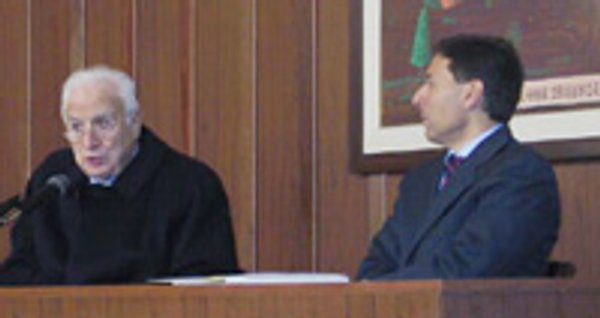Centro ELIS in Rome, Italy. During the inauguration of the school year at the ELIS center on November 25, Senator Francesco Cossiga, former President of Italy, spoke on the relationship between Saint Thomas More and the teachings of Blessed Josemaria. The ceremony opened with words by the Center's Director, Girolamo Inzerillo, who outlined the ideals of ELIS: "We are conscious of having in our hands a treasure, our students, and we are convinced that by forming them well, we are contributing to the improvement of tomorrow's society." Before handing over the podium to the guest of honor, Mr. Inzerillo also gave a brief review of the preceding academic year. Among other projects, the capacity of Centro ELIS was increased from 75 to 100 this year. Some of the new residents are students in various universities in Rome and among them are two with European fellowships provided by the Erasmus program.
The Lay Vocation
Senator Cossiga, in his address, reviewed the highlights of Sir Thomas More's life. He referred to the rich personality of the English saint, an outstanding figure in government and in the humanities. Thomas More was, in fact, one of the most erudite humanists of his time, in addition to being a profound and original thinker whose writings demonstrate a deep grasp of the needs of the period in which he lived, a period marked, in the religious sphere, by heresies and schisms. His heroic generosity and his faithfulness to the Church, which led him in the end to martyrdom, moved Pope John Paul II, during the Great Jubilee, to act on the requests of numerous heads of government, politicians and diplomats to proclaim him as "The Patron of Politicians and Statesmen."

Senator Cossiga emphasized Saint Thomas More's specific lay vocation, exercised principally through the circumstances of daily life, in his work as a lawyer and in his responsibilities as the father of a family. "The laity can and should cultivate an authentic secular spirituality that is exercised in one's professional work and in the ordinary
circumstances of one's family and social life. For this reason, Blessed Josemaria," Cossiga pointed out, "saw in Thomas More an apostle of the rich vocation of the laity. The founder of Opus Dei was a tenacious defender of the universal call to sanctity."
Senator Cossiga also noted that politics can be converted into a professional vocation for a Christian, as a temporal expression of one's commitment to justice and charity. This was in fact how Saint Thomas More acted when he took up the office of Grand Chancellor of England in 1530.
